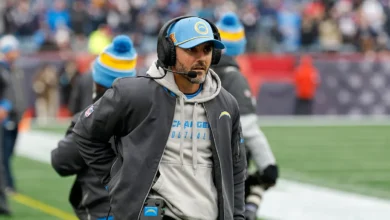
Introduction: The Name That Changed British Cycling
Sir Bradley Wiggins is a name etched deeply into the annals of British sports history. Known for his remarkable achievements both on the track and the road, Wiggins became a symbol of dedication, determination, and transformation within the cycling world. His journey from a talented young rider to one of the most decorated British athletes is as inspiring as it is complex.
What makes Bradley Wiggins truly stand out is not just his medal count, but the cultural impact he had on cycling in the UK. Before his era, British road cycling had relatively few household names. Yet, with his Tour de France victory, Olympic medals, and charismatic personality, Wiggins helped bring the sport into the national spotlight.
In this article, we’ll take a deep dive into his early career, his biggest achievements, the controversies he faced, and what life has looked like for him after professional racing.
Early Life and Path to Cycling Glory

Bradley Wiggins was born on April 28, 1980, in Ghent, Belgium, to an Australian father, Gary Wiggins, who was also a professional cyclist, and a British mother, Linda. His father left when Bradley was young, and he was raised in London, where his passion for cycling began to flourish. Growing up in a single-parent household wasn’t easy, but Wiggins credits his mother’s support as one of the key reasons he could pursue his dreams.
Bradley Wiggins interest in cycling sparked after watching Chris Boardman win gold in the 1992 Barcelona Olympics. That moment ignited a fire that led him to join local cycling clubs and participate in junior competitions. Even at a young age, his natural talent was evident. Wiggins showed an unusual combination of endurance and explosive speed—a rare blend in cycling.
By the late 1990s, he was already making waves on the track. His dedication to training, attention to detail, and ability to adapt quickly to professional demands set him apart from his peers. This was the beginning of a career that would span both track and road disciplines, something not many cyclists could excel at equally.
Track Cycling Dominance: The First Step to Stardom
Before conquering the road, Bradley Wiggins made his name in track cycling.Bradley Wiggins specialized in pursuit events, where his combination of power and precision gave him a distinct edge. In the 2000 Sydney Olympics, Wiggins won his first Olympic medal—a bronze in the team pursuit. This was just the start.
Athens 2004 was his true breakout moment. Wiggins walked away with three medals—gold in the individual pursuit, silver in the team pursuit, and bronze in the madison. This performance put him firmly on the map as one of the sport’s elite riders. His mastery of pacing and ability to hold an unrelenting speed over long distances made him nearly unbeatable in his prime.
Over the years, Wiggins collected numerous World Championship titles in the individual and team pursuits. His track career was not just about winning medals—it was about pushing the boundaries of what British cyclists could achieve. In many ways, he paved the way for the dominance of Team GB in subsequent Olympic Games.
Road Racing Success: From Track Star to Tour de France Champion
Transitioning from the track to the road is notoriously difficult, but Wiggins made it look effortless. Initially, he focused on time trials, where his track background gave him a significant advantage. Gradually, he developed the endurance and climbing ability needed to compete in stage races.
Bradley Wiggins most historic achievement came in 2012, when Bradley Wiggins became the first British cyclist to win the Tour de France. Riding for Team Sky, he dominated the time trials and held his own in the mountains, eventually claiming the yellow jersey in Paris. That victory wasn’t just personal—it was a turning point for British cycling. It inspired a generation and boosted the sport’s popularity across the nation.
That same year, Bradley Wiggins also won Olympic gold in the time trial at the London Games, cementing his status as a national hero. His 2012 season remains one of the most impressive in cycling history, combining Grand Tour victory with Olympic success—a rare feat that few riders have managed.
Style, Personality, and Public Image
Part of Bradley Wiggins’ appeal has always been his personality. Known for his sharp wit, outspoken nature, and distinctive mod-inspired style, Wiggins stood out in a sport that often takes itself too seriously. Whether it was his sideburns, tailored suits, or playful media interviews, he brought a certain charm and accessibility to cycling.
Fans admired him not just for his performances, but for his authenticity. He was never afraid to speak his mind, even if it ruffled feathers in the cycling world. This made him a relatable figure for many who saw him as a grounded, working-class hero who had made it to the top through sheer hard work.
However, this openness sometimes made him a target for criticism.Bradley Wiggins honesty could be interpreted as bluntness, and he occasionally found himself at the center of heated debates in the media. Nonetheless, his individuality remained one of his most defining traits.
Controversies and Challenges
No sporting career is without its challenges, and Wiggins faced his share of controversies. The most notable came in the form of questions surrounding his use of therapeutic use exemptions (TUEs) for certain medications during his career. While Wiggins maintained that he had followed all legal and medical guidelines, the issue sparked intense discussion about ethics in sport.
These allegations, though never resulting in a formal ban or disqualification, did cast a shadow over parts of his career. Wiggins himself has spoken about the toll it took on him personally and professionally. It’s a reminder that in the public eye, achievements and scrutiny often go hand in hand.
Despite the controversies, Wiggins remains one of the most decorated cyclists in history. His fans argue that his achievements on the bike far outweigh the negative headlines, and his legacy as a trailblazer for British cycling remains intact.
Retirement and Life Beyond Cycling
Bradley Wiggins officially retired from professional cycling in 2016. But stepping away from competition didn’t mean disappearing from the public eye. He has since pursued various ventures, including launching the Wiggins cycling team, working as a TV pundit, and writing autobiographies that give insight into his life on and off the bike.
He has also dabbled in other sports, including rowing, and taken part in charity events. His passion for cycling remains evident in his continued involvement in promoting the sport, especially at the grassroots level. Wiggins has been vocal about encouraging young riders to dream big, just as he once did.
Beyond sports, Wiggins has explored his love for music, art, and fashion—interests that have always been part of his identity. While his competitive days may be behind him, his influence on British cycling is still very much alive.
Legacy: More Than Just Medals
When discussing Bradley Wiggins’ legacy, it’s not enough to list his titles and records. His impact goes far deeper. He helped transform British cycling from a niche interest into a mainstream sport. His Tour de France victory was a catalyst for a new era, inspiring stars like Chris Froome, Geraint Thomas, and others to aim for the top.
Wiggins showed that British riders could compete—and win—on the biggest stages in cycling. He broke barriers, challenged norms, and brought a fresh energy to the sport. For many, he will always be remembered not just as a champion, but as a pioneer who changed the game for those who came after him.
Whether celebrated for his medals or his personality, Sir Bradley Wiggins remains one of the most important figures in modern British sporting history. His story is a reminder that talent, combined with determination and individuality, can leave an impact that lasts long after the final race.



